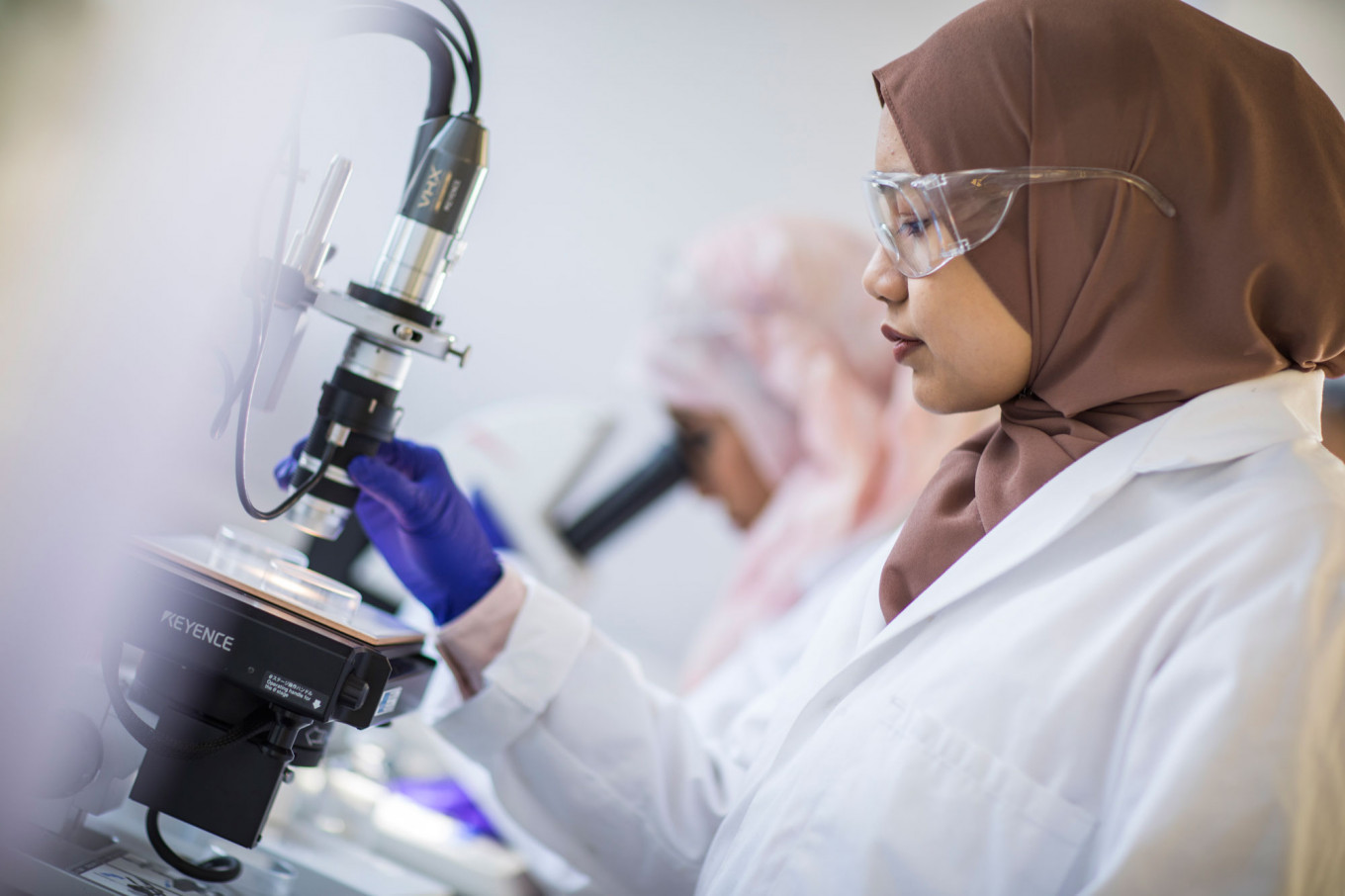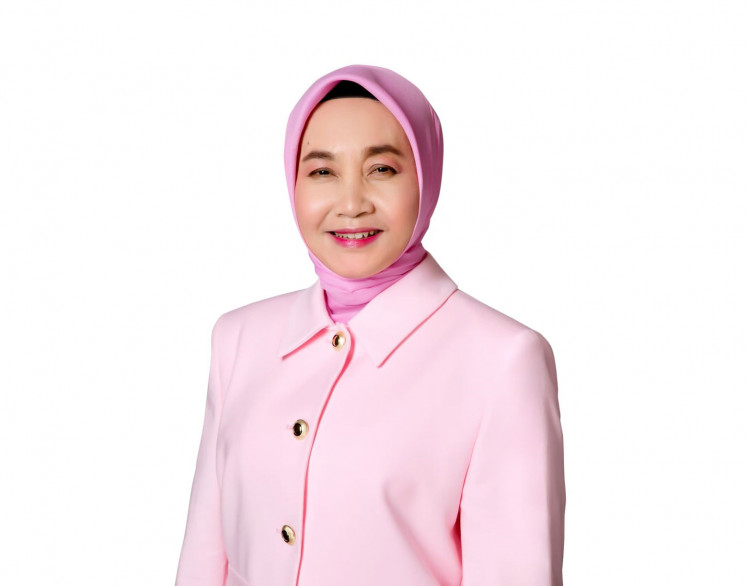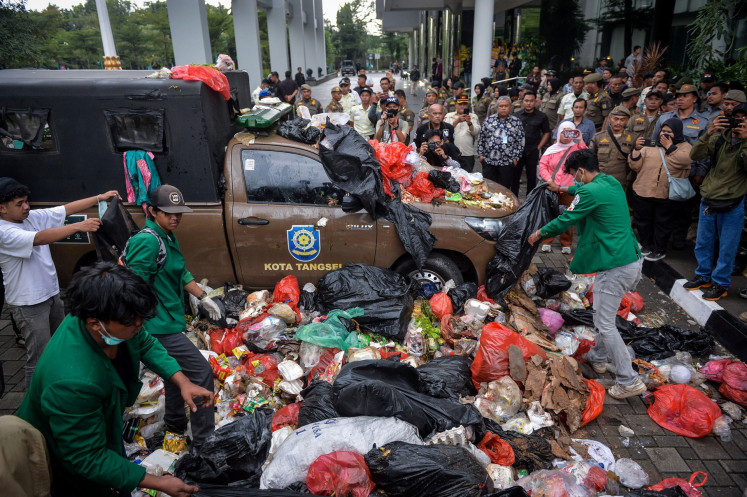Popular Reads
Top Results
Can't find what you're looking for?
View all search resultsPopular Reads
Top Results
Can't find what you're looking for?
View all search resultsWomen in STEM: building progress through collaboration and inclusion
Change text size
Gift Premium Articles
to Anyone
A
s a young girl, I dreamt of shaping future generations as a teacher, nurturing minds that would one day lead the nation. But that dream soon evolved, sparked by a fascination with the natural world during my time with the Scouts.
Rivers that carve paths from mountains to oceans, and even the smallest pebbles, play crucial roles in shaping our planet. It was this curiosity that led me to pursue Geology at Universitas Gadjah Mada (UGM) and embark on a journey in STEM (science, technology, engineering, and mathematics), a field where women were often scarce during the 1980s.
Today, I am encouraged to see that more women in Indonesia are following this path, contributing their talents to STEM. This growing presence was evident before my tenure as UGM’s first female rector in 2014 and continues through my current role as Head of the Meteorology, Climatology and Geophysics Agency (BMKG).
Yet, despite this progress, it remains fragile. While more women are studying STEM, many do not continue into related careers or leave the sector early in their professional lives.
This trend reflects a global challenge, as discussed in a recent British Council white paper on gender diversity in higher education. The paper underscores that while initiatives have increased women’s participation in STEM studies, these efforts often fall short in retaining women in their fields or advancing them to leadership roles.
This leakage in the pipeline is something we must address if we are to sustain the progress we've made.
Systemic change must begin within our education system. The British Council study highlights that embedding gender equity, diversity and inclusivity (GEDI) in higher education leadership can create a more innovative environment where diverse perspectives thrive.
Research shows that inclusive environments are more likely to produce creative solutions to complex problems, a reality we have observed across many sectors, including my work in meteorology and climatology.
By fostering these environments through flexible training, workshops and mentorship programs, we can close the skills gap and support women to stay, advance and flourish in STEM fields.
My own academic journey took me to the United Kingdom, where I earned both my master’s and doctoral degrees. These experiences were instrumental in shaping my mentality, expanding my perspectives, and equipping me with the tools needed to lead in STEM. It is this collaborative and inclusive approach to education and research that we must replicate.
The white paper emphasizes that cross-sector collaboration is crucial to driving innovation in STEM—a lesson I have learned firsthand through international partnerships and joint research initiatives that have had a direct impact on Indonesia’s climate resilience efforts, helping mitigate the risks of landslides, earthquakes and tsunamis.
The ASEAN-UK SAGE and British Council’s Women in STEM scholarships and other such STEM scholarships for women are prime examples of such initiatives. By offering Indonesian women the opportunity to study master’s programs in fields like Biotechnology, Computer Science, and Environmental Engineering at top UK institutions such as the University of Bath, the British Council is working to close the gender gap in STEM and cultivate a new generation of female leaders.
These scholarships not only provide women with world-class education but also expose them to global networks, fostering cross-cultural exchanges of ideas and innovations. The white paper points to the importance of such exposure in broadening perspectives and enhancing women’s contributions to global STEM conversations, ultimately enabling them to lead change at both local and international levels.
However, real progress requires that universities and institutions go beyond token representation. We need policies that actively promote GEDI and place more women in leadership and decision-making roles. The white paper findings suggest that having women in these roles not only benefits institutional culture but also contributes to better decision-making and stronger research outcomes.
Empowering women to lead will enable both students and faculty to reach their full potential and drive positive change in their fields. Regional organizations can also benefit from collaborative research opportunities and shared spaces for dialogue, which provide fertile ground for inclusive growth.
On a national scale, institutionalizing GEDI policies and actively recruiting women into STEM roles—whether in academia or government—will lead to a more balanced and supportive system. As the white paper suggests, when inclusivity is prioritized, it accelerates progress and fosters environments that are more resilient and capable of addressing the complex challenges facing our world today.
STEM is a cornerstone of our society and critical to the advancement of civilization. We cannot afford to exclude women from these fields; their contributions are essential to driving innovation and solving the complex challenges our world faces. The British Council understands this need for inclusivity in STEM and is committed to supporting Indonesian women in breaking through barriers. Through its scholarships and collaborations, the organization is helping to build bridges between Indonesia and the UK, fostering a spirit of international cooperation that benefits all.
We need more Marie Curies, and I believe that by increasing women’s participation in STEM, the impact will be profound—both in terms of scale and societal transformation. Together, we can harness the full potential of STEM by ensuring women are not just present but are empowered to lead.
I call on Indonesian women to seize these opportunities, to work hand in hand with their counterparts both nationally and internationally. Together, we can shape a future where STEM is truly inclusive and reflective of the diversity of our world.
To read more about British Council’s GEDI study, please visit https://shorturl.at/Owh0I
For more information on ASEAN-UK SAGE scholarships, visit https://shorturl.at/4OfnE
Source: British Council












